[Translation][Spanish] Node.js (1053 words) (Part 43)
Project Details
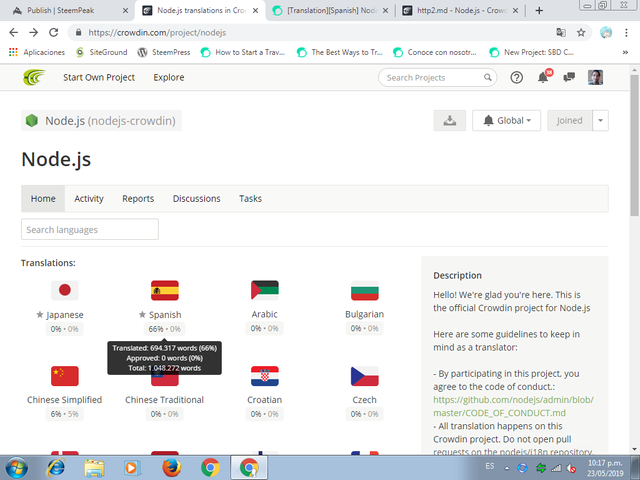
Node.js is an open-source, cross-platform JavaScript run-time environment that executes JavaScript code outside the browser.
Node.js brings event-driven programming to web servers, enabling development of fast web servers in JavaScript. Developers can create highly scalable servers without using threading, by using a simplified model of event-driven programming that uses callbacks to signal the completion of a task. Node.js connects the ease of a scripting language (JavaScript) with the power of Unix network programming.
In easier to understand words: Node-js is a free platform whose goal is to provide its users the possibility to create lightweight and cost efficient web servers, how does Node.js do this?
Node.js handles web server connections in a way so they don´t take up as much space in a server, and thus, the owner of a project would not need to invest as much money in multiple servers to store so much information in Gigabytes.
Being an Open Source Project, Node.js possesses immense value for providing so much while at the same time being totally free.
Contribution Specifications
694,317 words have been translated so far in the Spanish folder of Node.js, which amounts to a total of 66% done in regards to the completion of the translation of this big project.
Translation Overview
In this contribution, I continued translating the second http2.md folder of Node.js.
"HTTP/2" stands for "Hypertext Transfer Protocol, version 2", which refers to the network protocol used by the World Wide Web, created with the goal of updating the HTTP/1.1 protocol.
HTTP 2.0 doesn't modify the application semantics of HTTP. All of the basic concepts, such as the HTTP methods, status code, URI, and header fields stay unmodified; however, HTTP 2.0 introduces countless updates such as the usage of a single connection, header compression and the ‘server push’ service.
One of the relevant changes introduced by HTTP 2.0 is the removal of redundant information, whose objective is to avoid sending repetitive data during the same connection; thus resulting in decreased consumed resources, achieving less amounts of latency.
According to W3Techs, as of March 2019, 33.9% of the top 10 million websites supported HTTP/2.
This is my fifth translation contribution on the http2.md folder.
There are certain words that have reappeared in multiple strings while working on the same folder. Some of those words are: listener, event and object.
These are some examples of strings that show these words:
1 . OBJECT
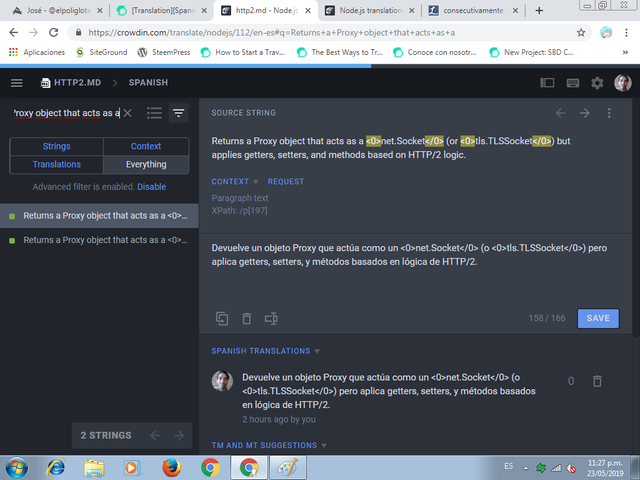
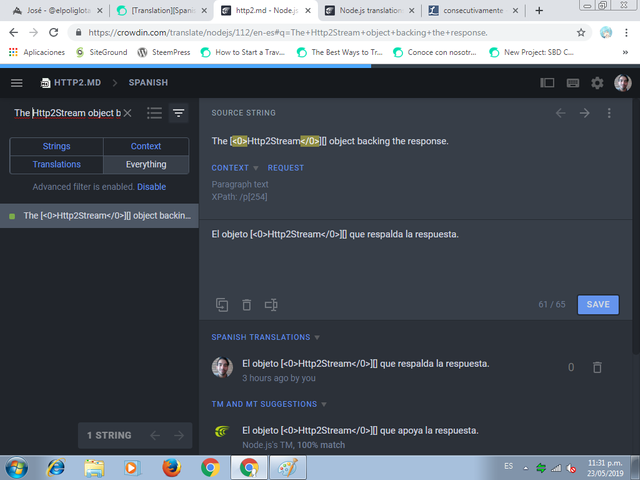
2 . EVENT
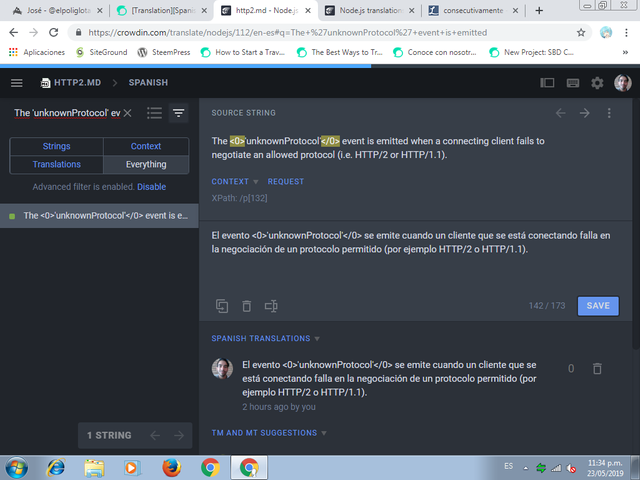
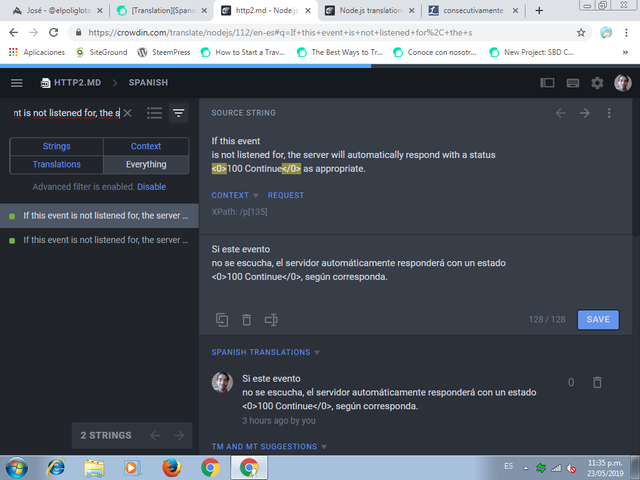
3 . LISTENER
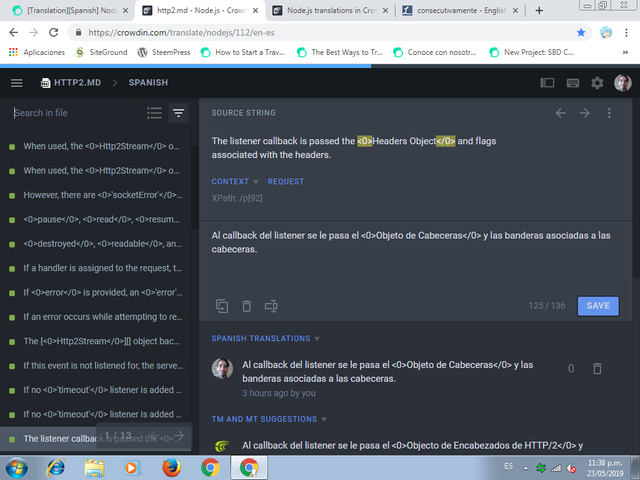
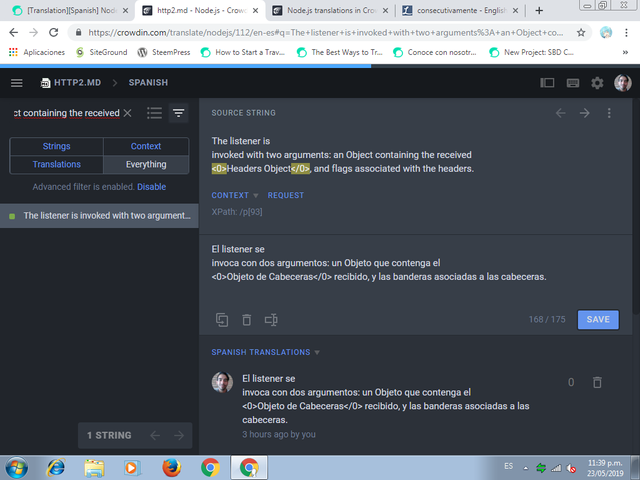
Since these three concepts have appeared multiple times in my last contributions, I will now proceed to explain their meanings:
Listener:
A listener is a procedure or function in a computer program that waits for an event to occur.
The term event listener is often specific to Java and JavaScript.
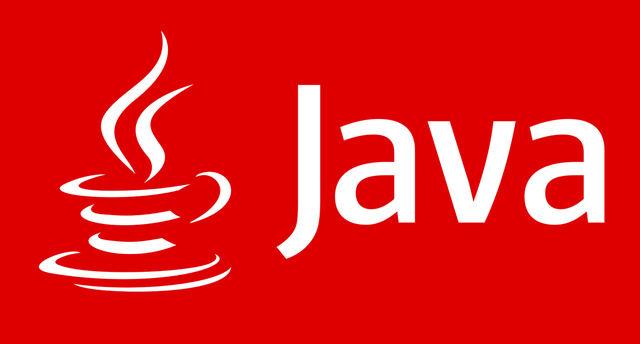
An event listener in Java is designed to process some kind of event — it "listens" for an event, such as a user's mouse click or a key press, and then it responds accordingly.

Event:
An event is an action or occurrence recognized by a software.
If a user clicks on a button, clicks on a combo box, or types characters into a text field, etc., then an event triggers, creating the relevant event.
Here are some of the most common types of events in Java:
(A.) ActionEvent: Represents a graphical element is clicked, such as a button or item in a list. Related listener: ActionListener.
(B.) ContainerEvent: Represents an event that occurs to the GUI's container itself, for example, if a user adds or removes an object from the interface. Related listener: ContainerListener.
(C.) KeyEvent: Represents an event in which the user presses, types or releases a key. Related listener: KeyListener.
(D.) WindowEvent: Represents an event relating to a window, for example, when a window is closed, activated or deactivated. Related listener: WindowListener.
(E.) MouseEvent: Represents any event related to a mouse, such as when a mouse is clicked or pressed. Related listener: MouseListener.
Object:
An object is a unit that lies within a computer program made up of a state and a behaviour.
It is a basic unit of Object Oriented Programming and represents the real life entities. A typical Java program creates many objects, which interact by invoking methods. An object consists of :
State : It is represented by attributes of an object. It also reflects the properties of an object.
Behavior : It is represented by methods of an object. It also reflects the response of an object with other objects.
Identity : It gives a unique name to an object and enables one object to interact with other objects.
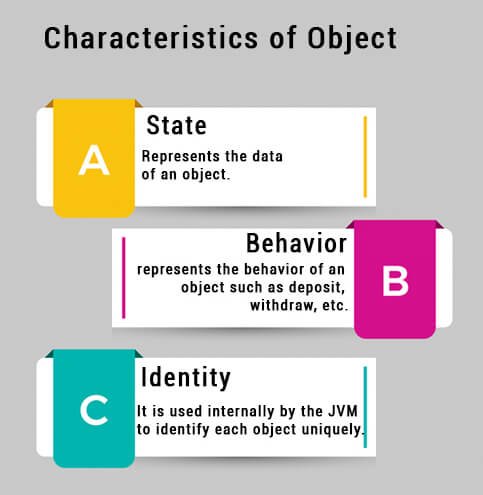
Words translated so far on http2.md

Here's the link to the http2.md folder:
Languages
The project's source language is English and it is being translated into Spanish.
Also, Node.js is currently being translated into other 32 languages. I´m contributing to making this project accessible to the Spanish speaking community online.
Besides collaborating as a translator for Open Source Projects on Crowdin I also work as a Freelance Translator for a law firm in the US, I've been working for that company for one year and five months, translating sworn statements and legal documents from English to Spanish and viceversa.
Open Source Projects I've worked on and contributed to as a translator:
5 . Node.js
Word Count
Part 1: 1016; Part 2: 1026; Part 3: 1035; Part 4: 1092; Part 5: 1050; Part 6: 1147; Part 7: 1133; Part 8: 1049; Part 9: 1090; Part 10: 1093; Part 11: 1024; Part 12: 1102; Part 13: 1085; Part 14: 1049; Part 15: 1035; Part 16: 1059; Part 17: 1041; Part 18: 1114; Part 19: 1114; Part 20: 1033; Part 21: 1030; Part 22: 1059; Part 23: 1047; Part 24: 1070; Part 25: 1151; Part 26: 1039; Part 27: 1025; Part 28: 1035; Part 29: 1063; Part 30: 1037; Part 31: 1047; Part 32: 1023; Part 33: 1041; Part 34: 1064; Part 35: 1060; Part 36: 1052; Part 37: 1055; Part 38: 1064; Part 39: 1066; Part 40: 1071; Part 41: 1051; Part 42: 1058; Part 43: 1053.
Total of words translated so far: 45585.
Proof of Authorship
This translation contribution was submitted via Crowdin on May 21st.
For further Proof of Authorship in regards to this contribution you can see my activity on Crowdin here.
Greetings, @elpoliglota. Thanks for submitting your contribution!
Congratulations on this collaboration!
Your contribution has been evaluated according to Utopian policies and guidelines, as well as a predefined set of questions pertaining to the category.
To view those questions and the relevant answers related to your post, click here.
Chat with us on Discord
Thank you for your review, @alejohannes! Keep up the good work!
Hi @elpoliglota!
Your post was upvoted by @steem-ua, new Steem dApp, using UserAuthority for algorithmic post curation!
Your post is eligible for our upvote, thanks to our collaboration with @utopian-io!
Feel free to join our @steem-ua Discord server
Hey, @elpoliglota!
Thanks for contributing on Utopian.
We’re already looking forward to your next contribution!
Get higher incentives and support Utopian.io!
Simply set @utopian.pay as a 5% (or higher) payout beneficiary on your contribution post (via SteemPlus or Steeditor).
Want to chat? Join us on Discord https://discord.gg/h52nFrV.
Vote for Utopian Witness!